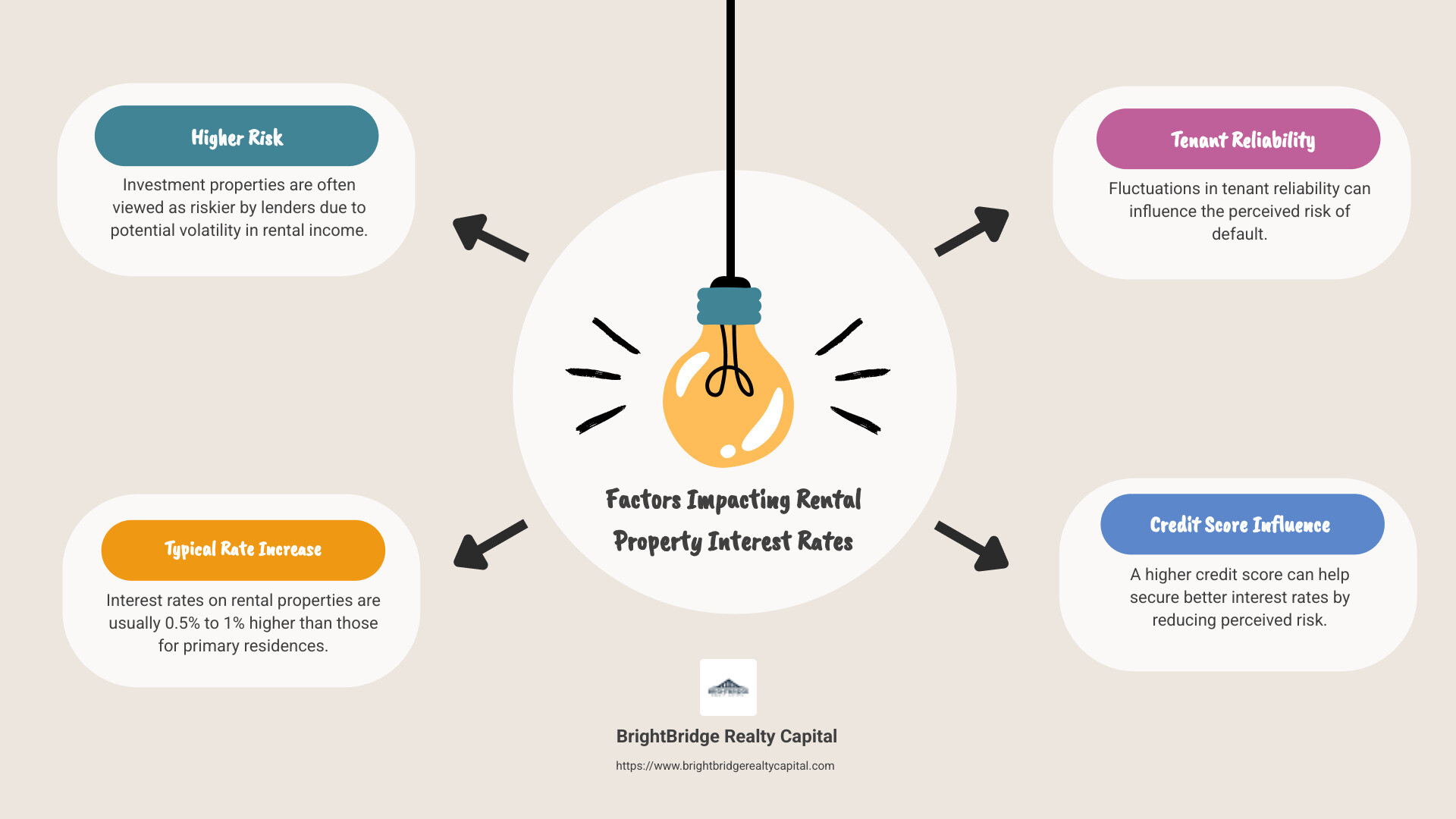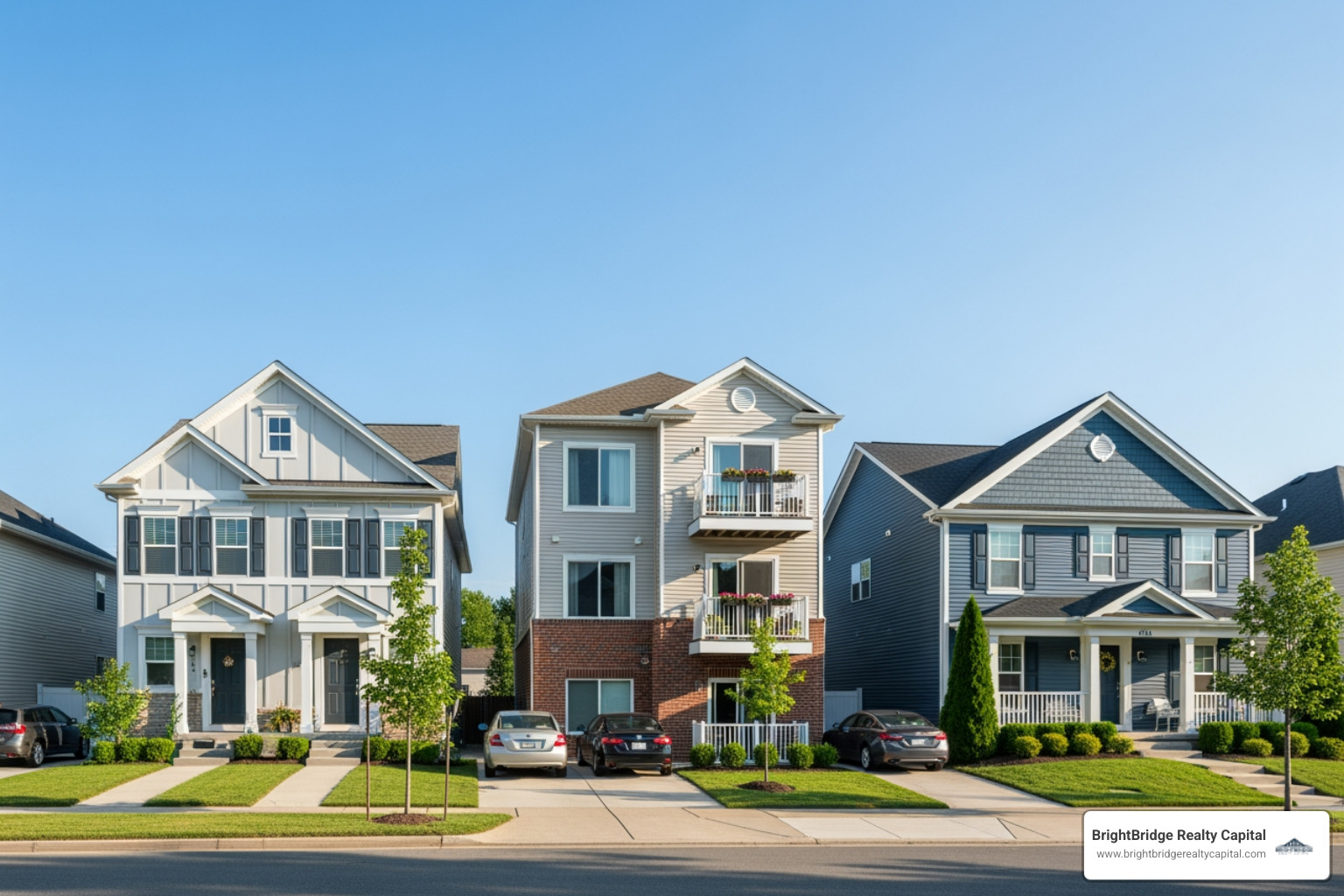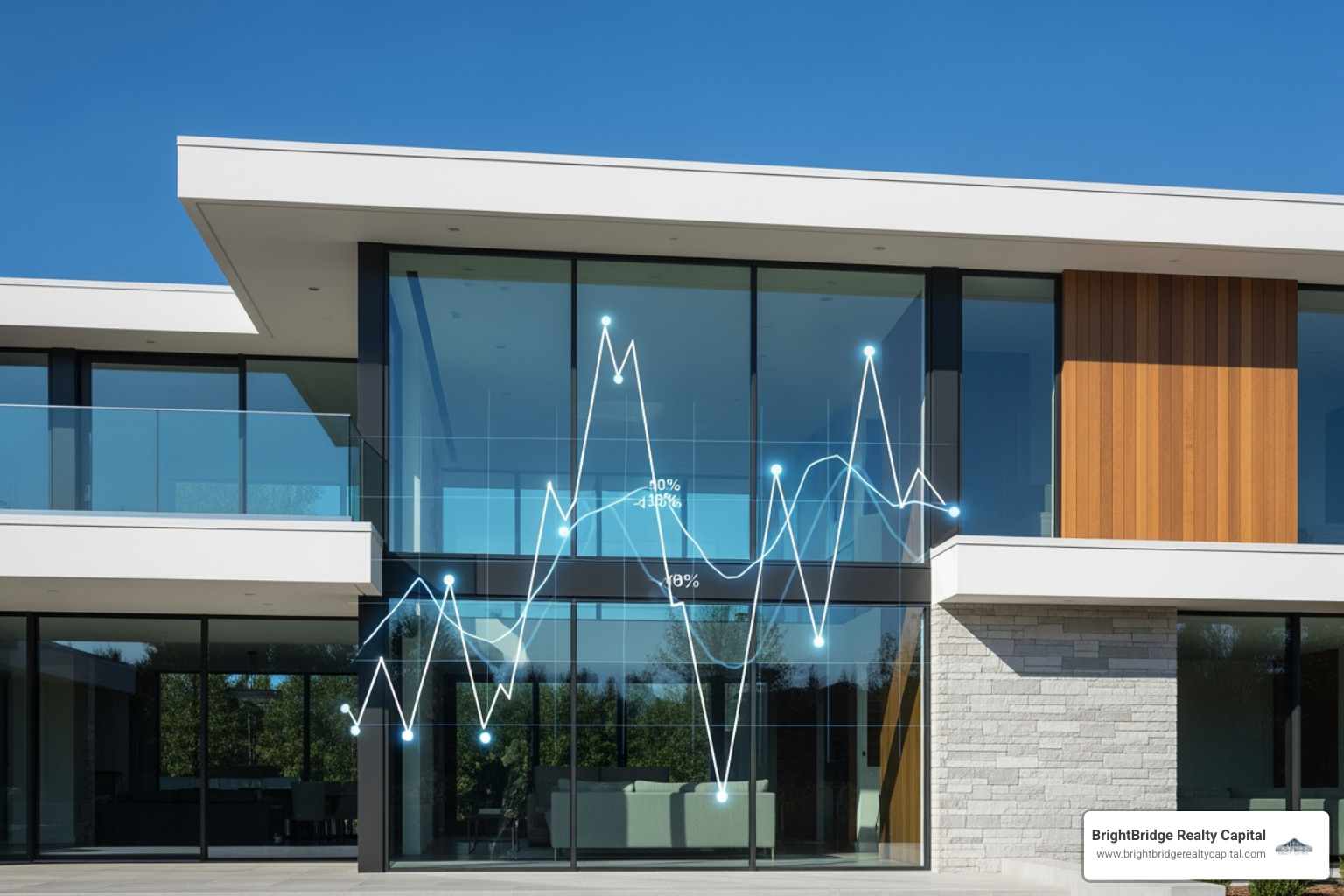The Rental Rate Rundown: Understanding Average Interest Rates

Average interest rate for rental property can be a key consideration when diving into real estate investing. Simply put, these rates are generally higher than those for primary residences due to increased risk for lenders. The extra risk stems from the reliance on rental income to cover mortgage payments, which can fluctuate with tenant reliability.
- Typical Interest Rate Range: Rental property mortgage rates typically range from 0.5% to 1% higher than rates for primary residence mortgages.
- Why Higher Rates? Lenders see rental properties as riskier ventures. If tenants skip rent payments or vacancies arise, the risk of mortgage default increases.
Understanding these nuances can help you decide when and where to invest. Prioritizing a strong credit score and larger down payments can make a difference in securing a favorable rate. As you steer this landscape, the right financing is essential for long-term success.

Quick average interest rate for rental property terms:
- interest rate for investment property today
- conventional mortgage rates investment property
- 15 year fixed mortgage rates for investment property
What Influences the Average Interest Rate for Rental Property?
When considering average interest rates for rental property, several factors come into play. These elements can significantly impact the rate you secure from lenders. Let's break down the main influences.
Credit Score Impact
Your credit score is a critical factor. A higher credit score often translates to better interest rates. Why? Lenders perceive you as a lower risk. Generally, a score of 740 or higher can open up more favorable rates. If your score is below this threshold, you might face higher rates, sometimes by as much as 0.5% to 1%.
- Tip: Regularly check your credit report for errors and work on improving your score by paying bills on time and reducing debt.
Down Payment Requirements
The size of your down payment can also sway your interest rate. A larger down payment reduces the lender's risk, often leading to a lower rate. For investment properties, a down payment of 25% or more is ideal. This not only lowers your loan-to-value ratio (LTV) but also strengthens your negotiating position with lenders.
- Example: With a 25% down payment, you might see a reduction in interest rate by 0.125% to 0.25%.
Loan Type and Term
The type of loan and its term also play roles in determining interest rates. Fixed-rate mortgages offer stability with consistent payments, while adjustable-rate mortgages (ARMs) might start with lower rates that can increase over time.
- Fixed vs. Adjustable: Fixed-rate loans provide predictability, which can be beneficial in a fluctuating market. However, ARMs might be attractive if you plan to sell or refinance before the rate adjusts.
Choosing the right loan type depends on your financial goals and how long you plan to hold the property. Each choice comes with its own set of risks and benefits, so consider your long-term strategy carefully.
Understanding these factors can help you secure a better average interest rate for your rental property, setting you on a path to successful real estate investment.
Current Trends in Rental Property Interest Rates
Navigating rental property interest rates can feel like riding a rollercoaster, especially with today's economic influences and historical trends. Let's explore what's driving these rates and how they've changed over time.
Economic Influences
Several economic factors are currently shaping the average interest rate for rental property. Inflation, for one, plays a significant role. When inflation rises, the Federal Reserve often increases interest rates to keep the economy in check. This, in turn, impacts mortgage rates, including those for rental properties.
- Inflation's Impact: Higher inflation leads to higher interest rates as lenders seek to maintain their profit margins. This can make borrowing more expensive for property investors.
Economic uncertainty also affects interest rates. Factors like global events, trade policies, and shifts in consumer confidence can lead to rate fluctuations. When the economy is uncertain, lenders may increase rates to hedge against potential risks.
- Federal Reserve's Role: The Federal Reserve's monetary policies set the stage for interest rate trends. Their decisions on rate hikes or cuts directly influence the borrowing costs for rental property investors.
Comparing Historical Rates
Understanding historical rate trends can provide context for today's market. Over the past few decades, interest rates have experienced significant highs and lows. For example, the early 1980s saw rates soar above 18%, while recent years have seen much lower averages.
- Historical Rates Overview: In 2025, the average mortgage rate for a primary residence hovers around 6.75%, with rental property rates typically higher due to increased risk factors.
Comparing these rates over time highlights the cyclical nature of the market. Economic booms and recessions create peaks and troughs in interest rates. For investors, this means staying informed and timing investments wisely can lead to better financing opportunities.
- Rate Trends: Keeping an eye on historical data helps predict future movements. For instance, if rates have been steadily climbing, it might indicate a need to act quickly before they rise further.
In summary, understanding the economic influences and historical trends in rental property interest rates can help investors make informed decisions. By staying aware of these factors, you can better steer the ever-changing landscape of real estate investment.
How to Secure the Best Average Interest Rate for Rental Property
Securing the best average interest rate for rental property might seem challenging, but with the right strategies, you can make it happen. Let's explore how to improve your financial profile and find the best lender.
Improving Your Financial Profile
Boost Your Credit Score: A higher credit score can open up better mortgage rates. Aim for a score of 740 or higher to access the most favorable terms. Pay bills on time, reduce outstanding debts, and avoid opening new credit lines unnecessarily.
Reduce Debt: Lowering your debt-to-income (DTI) ratio is crucial. Pay down high-interest debts like credit cards. This not only improves your credit score but also shows lenders you can manage additional debt responsibly.
Financial Preparation: Ensure you have enough savings to cover at least three to six months of mortgage payments. Lenders like to see that you have a financial cushion, which can lead to better loan terms.
Shopping Around for Lenders
Compare Lenders: Don't settle for the first offer. Different lenders offer various rates and terms, so shop around. Compare at least three to five lenders to find the most competitive rates.
Negotiate Rates: Use the quotes you've gathered to negotiate with lenders. Let them know you've received lower offers and see if they can match or beat them. Mortgage rates are not set in stone.
Consider Loan Types: Different loans come with different rates. Decide whether a fixed-rate mortgage or an adjustable-rate mortgage (ARM) fits your strategy. Fixed rates provide stability, while ARMs might offer lower initial rates.
Pre-approval: Get pre-approved for a loan. This shows sellers you're a serious buyer and helps you understand how much you can afford. Plus, it can speed up the closing process once you find the right property.
By focusing on these strategies, you can position yourself to secure a favorable average interest rate for your rental property. Start by enhancing your financial profile and then explore various lenders to find the best deal.
Frequently Asked Questions about Average Interest Rate for Rental Property
Are mortgage rates higher for investment properties?
Yes, mortgage rates for investment properties are generally higher than those for primary residences. This is because lenders see investment properties as riskier. If you can't find tenants or the value of the property drops, you might struggle to make payments. As a result, lenders charge higher rates to offset these risks. Typically, you can expect investment property rates to be about 0.25% to 0.875% higher than conventional mortgage rates.
What is a good interest rate for a rental property?
A good interest rate for a rental property is one that allows you to manage your mortgage payments comfortably while also covering other expenses, like property taxes and maintenance. In today's market, a competitive rate might be slightly higher than the rates for owner-occupied homes. To determine what's good, compare current rates with historical trends and consider your financial situation. What's good for one investor might not be ideal for another, so always align the rate with your investment goals.
How can I lower my rental property mortgage rate?
Lowering your rental property mortgage rate involves a mix of financial strategies and negotiation. Here are some steps to consider:
Improve Your Credit Score: A better credit score can lead to lower interest rates. Aim for a score of 740 or higher by paying bills on time and reducing outstanding debts.
Make a Larger Down Payment: Putting down at least 20% can help you secure a better rate, as it reduces the lender's risk.
Reduce Your Debt: Lowering your debt-to-income ratio makes you a more attractive borrower. Pay off high-interest debts to improve your financial profile.
Shop Around: Don't accept the first offer you receive. Compare rates from multiple lenders, including banks and credit unions.
Negotiate: Use the quotes you've gathered to negotiate with lenders. Let them know about better offers you've received and see if they can match or beat them.
By implementing these strategies, you can improve your chances of securing a more favorable mortgage rate for your rental property.
Conclusion
Investing in rental properties can be a rewarding strategy for building long-term wealth. At BrightBridge Realty Capital, we understand the complexities involved in securing the best financing solutions for your investment journey. Our mission is to provide customized, flexible funding options that cater to your specific needs, making the process seamless and efficient.
Why Choose BrightBridge Realty Capital?
Fast Closings: We specialize in quick closings, often within a week. This speed can give you a competitive edge in the market, allowing you to act swiftly on investment opportunities.
Direct Lending: By eliminating intermediaries, we offer competitive rates and a straightforward process, ensuring you get the best deal possible.
Custom Solutions: Whether you're expanding your rental portfolio or refinancing an existing property, our solutions are designed to align with your investment strategy.

Long-term Benefits of Rental Property Investment
Investing in rental properties offers numerous long-term benefits. These include building equity, generating passive income, and diversifying your investment portfolio. As property values appreciate, your investment's value can increase, providing a solid return over time. Moreover, rental income is not subject to Social Security tax, offering additional financial advantages.
Strategize for Success
To maximize your investment returns, it's crucial to adopt a strategic approach. This includes understanding the average interest rate for rental property and how various factors like credit score, down payment, and loan type influence these rates. By improving your financial profile and shopping around for the best rates, you can secure favorable terms that improve your investment's profitability.
At BrightBridge Realty Capital, we're committed to supporting your investment journey with expert guidance and custom financing solutions. Ready to start building generational wealth? Explore our financing options and let us help you achieve your real estate investment goals.


